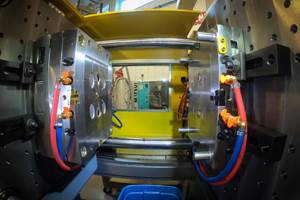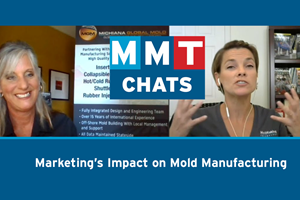Survival Tools
Qualities that make a successful tooling engineer can come in handy when handling other life challenges.
Being a successful tooling engineer takes, among other qualities, determination and perseverance, which are tools in each of our toolboxes that may be undervalued. Well, they were priceless to me when a health crisis knocked on my door.
I was the type of engineer who worked 24/7 and spent more time at work (at least mentally) than I did at home. Little did I know that the weight of this lifestyle would come crashing down on me and change my life. I suffered a mild stroke 20 months ago that still has implications today. During the time since, I have been determined to get through this health incident intact while incurring a minimal amount of financial debt. This focus is very similar to what you need to be successful in manufacturing, where competition is fierce and lead times continue to get shorter.
Several issues I faced after my stroke included deciphering who is responsible for getting prior authorizations for treatment through the healthcare provider, finding out who coordinates getting test results to all the doctors involved and trying to coordinate office procedures that varied from office to office. All of these issues quickly felt very familiar to the obstacles I faced in my toolroom daily, including project deadlines, design changes and customer demands.
I quickly discovered (much like in my job) that I was responsible for ensuring that all prior authorizations were approved through the insurance company. Of course, this was information that no doctor’s office readily offered. It actually took two hiccups within the system before I figured it all out. My solid program manager skills kicked in and I got the billing reviewed and approved.
Timing and scheduling are two familiar shop challenges that have also been critical in my healthcare management. For example, I needed both a CAT scan and an MRI through two different doctors' offices. Typically, it takes seven days to get pre-approval for these procedures from the insurance company, then another two to four days to get the test scheduled. The CAT scan was appropriately scheduled, but the MRI was past due and I still had no prior authorization. I began calling the doctor's office every other day for a status check. After two weeks, I contacted the insurance company to identify the reason for the delay. In a matter of minutes, I discovered that the insurer never received any prior authorization requests for the test. I immediately informed the doctor’s office, and within three days the insurance company approved the test, and it was scheduled within five days.
This is very similar to scenarios I encounter on the floor as a program manager, such as following up on “program milestones” statuses.
I was also responsible for making sure all test results were received by the six doctors involved in my case. Keep in mind that each office had different operating procedures, making this task much more difficult. There was no common “control plan” from which to work. Although most offices had gone electronic as far as appointment scheduling and records review, all their systems were different. This required quite a bit of learning on my part. Does any of this sound like your work environment yet?
The most difficult part of this crisis has been leaving work and adjusting to the “time off.” Today, I am hopeful that I am in the final stages of this healthcare “program,” but how it will end is still unclear. I do know that I am handling it now with the same determination and perseverance that I would handle a tooling program at work, and that puts me at ease.
Related Content
Predictive Manufacturing Moves Mold Builder into Advanced Medical Component Manufacturing
From a hot rod hobby, medical molds and shop performance to technology extremes, key relationships and a growth strategy, it’s obvious details matter at Eden Tool.
Read MoreTransforming Moldmaking into Digital Industrial Manufacturing
Moldmaking and digitalization is at the core of this global industrial manufacturing company’s consolidation and diversification plan.
Read MoreMMT Chats: Marketing’s Impact on Mold Manufacturing
Kelly Kasner, Director of Sales and Marketing for Michiana Global Mold (MGM) talks about the benefits her marketing and advertising, MGM’s China partnership and the next-generation skills gap. This episode is brought to you by ISCAR with New Ideas for Machining Intelligently.
Read MoreSteps for Determining Better Mold Prices
Improving your mold pricing requires a deeper understanding of your business.
Read MoreRead Next
Time-to-Market Strategizing
Editorial Advisory Board (EAB) Insight from Vic Baez.
Read MoreReasons to Use Fiber Lasers for Mold Cleaning
Fiber lasers offer a simplicity, speed, control and portability, minimizing mold cleaning risks.
Read More





.jpg;maxWidth=300;quality=90)
_300x250 3.png;maxWidth=300;quality=90)



.png;maxWidth=300;quality=90)












